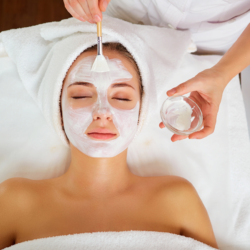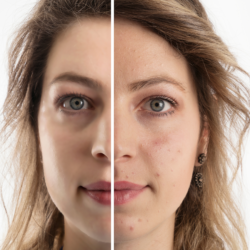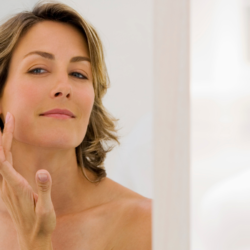Breakouts can be annoying and embarrassing, and if you are one of the approximately 50 million Americans with acne, then you are living with this uncomfortable condition more often than you care to be. As you may know, acne appears when the small pores of your skin are blocked with oil, dead skin cells and/or bacteria, forming a plug, which leads to inflammation and redness.
So, what are the causes of this skin disorder? In this list, we are going to explain reasons with high levels of information backing them, but also less researched reasons that can be at the center of your acne problem. This information will be accompanied by the suggested specific remedy, solution or guide to an acne-free skin.
- Hormonal imbalance. Hormonal changes happening in the body can increase the chances of developing acne. The rise of androgens (testosterone), very common in adolescences but also in adults with a dysfunction of the hormonal system, can complicate the whole picture. This unbalance produces more oily skin, leading to the appearance of pimples. For improved oil control, contact your physician or consult with a dermatologist – he or she will guide you and may even prescribe some lab tests to understand more about your hormonal system.
- Genetics. This can be the reason why some people develop acne and others do not. Having a first-degree relative with acne can increase the chances of having acne by four times. These genes may contribute to a higher skin sensitivity, an increased oil production rate and strong inflammatory responses to microorganisms and skin irritants. Unfortunately, at the moment, nothing can battle genetic predisposition. We recommend living a healthy lifestyle and following the other guidelines in this article and The Best and Worst Acne-Fighting Habits blog.
- Unhealthy diet. A diet rich in unhealthy fats, starches, and refined sugars is not good for oily skin control. Some studies cite this as a reason for acne, but also relate acne with the consumption of dairy products and chocolate. Maintain a healthy diet rich in lean proteins, natural carbs, healthy fats and plenty of vegetables to have the full intake of vitamins and micro-nutrients as a part of healthy well-balanced diet.
- Touching your face too often. This simple action can make your face turn into the dirtiest part of your body, adding bacteria that can generate acne breakouts. So, keep your hands far from your face and maintain good hand hygiene by washing your hands frequently. And remember, no matter how tempting, do not pick at your pimples!
- Stress. This is a factor that aggravates an already existing condition by negatively affecting your hormonal system. Stress affects your adrenal glands, increasing the levels of androgens, thereby producing more oily skin. Stress also increases blood flow so your skin will appear red and inflamed. Lower your stress levels by engaging in a regular exercise routine, getting enough sleep and employing other stress control methods, like meditation, yoga or mindfulness.
- Not washing your skin at night. Sleeping with your makeup on is bad, and so is leaving on the debris, dirt, and oil that stuck to your face during the day. This combination of environmental elements can plug and block your pores, increasing the chances of breakouts. Clean your skin every night before going to sleep. If you are too tired, do it earlier in the evening. At a minimum wash your face with warm water and a gentle cleansing product, and if you want, apply your night products, serums and creams, on a clean, dry face. Learn more about our Oily Skin Control Face Wash.
- Using new skin care products. Sometimes, when introduced to your skin, new products can generate some blemish purging. If the reaction continues for 1 or 2 months it means that the products are not the right ones for your skin. Use one new product at a time. Use it for a few days to a week before introducing another skincare product. This way you can determine what product is good or bad for your skin.
- Temperature changes. Passing from a warm day to a cold one the next day can confuse your skin, leading to breakouts. Change your skin care routine according to the weather, using moisturizers one day and exfoliators the other, depending on the case.
- Using facial brushes or scrubs. When used too often or too vigorously on your skin, these products can augment breakouts by directly affecting the pores. So, do not apply these products with too much pressure on the face. Massage your skin lightly and in circular motions. After this, apply an oil-free serum and/or moisturizer. Try physical and acid exfoliators, and see what is best for you. Learn more about our Oily Skin Control Moisturizer.
- Medication. Some medicines can cause acne as a side effect. Examples of these are tuberculosis medication, steroids, birth control pills, and psychiatric medication, among others. Consult with your physician or dermatologist about the best options for your overall health and well-being. Be sure to consider the risks and benefits of taking the prescription.
- Smoking. By partaking in this high-risk habit, you decrease the quantity of oxygen that nourishes your face and skin. Smoking not only predisposes you to cancer and other illness, but it also affects the microscopic structures of your skin, leading to more breakouts. The solution? Do not smoke. Very simple.
Read More Blogs






